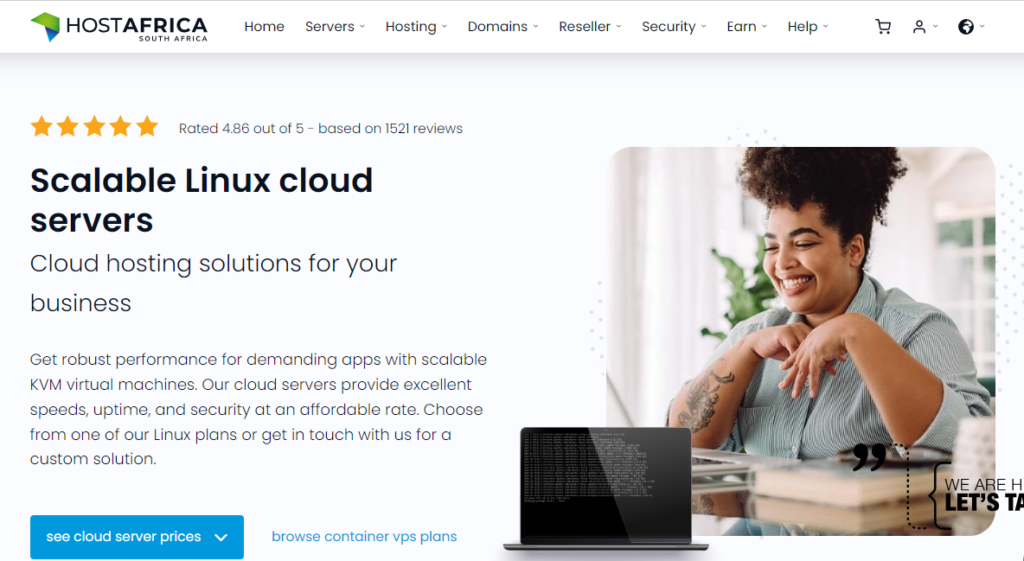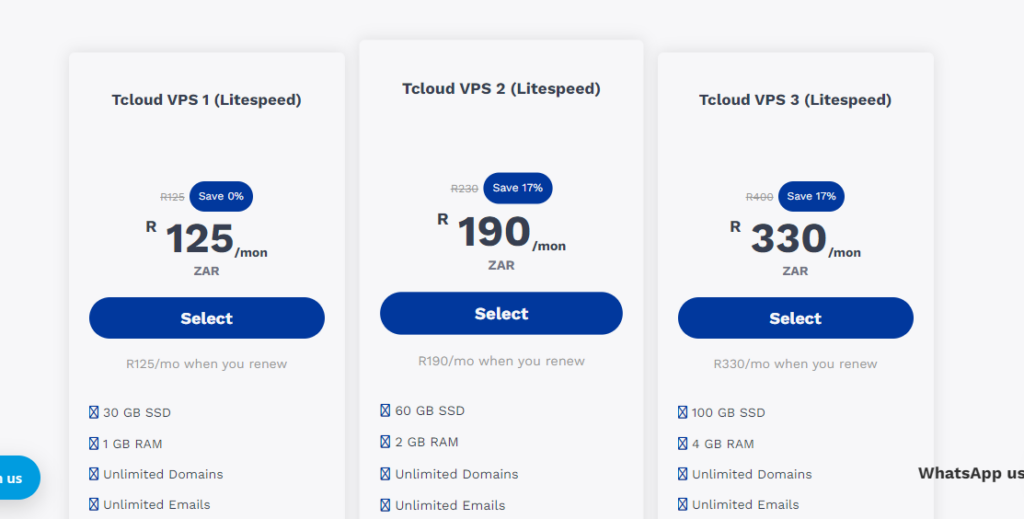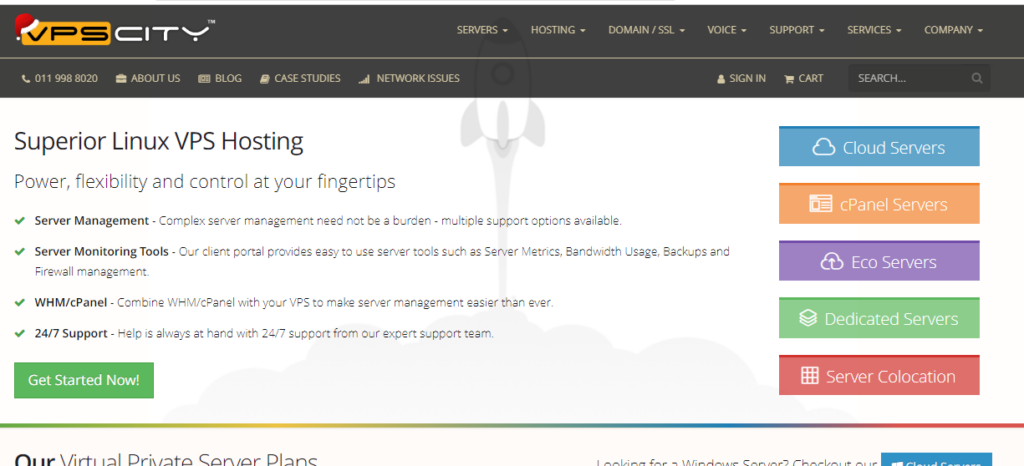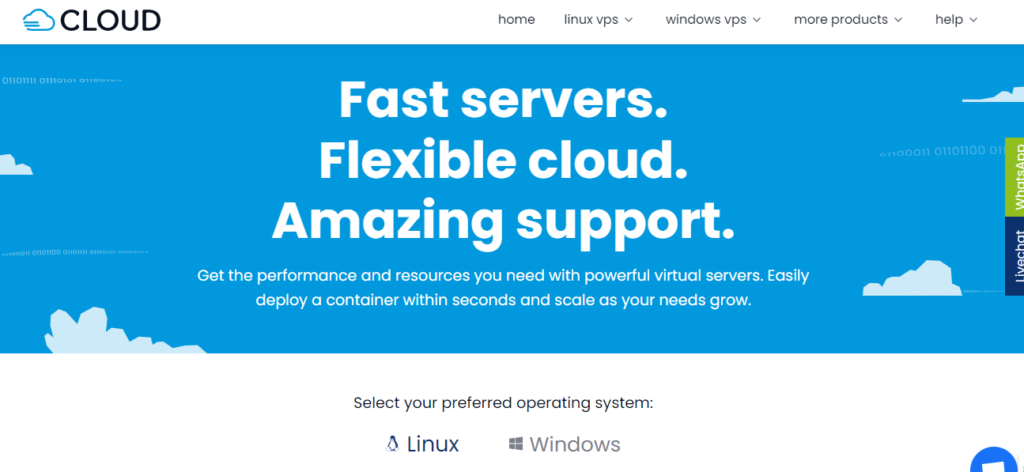A Linux VPS (Virtual Private Server) uses virtualization technology to partition physical servers into multiple virtual machines.
Each virtual machine runs its own instance of the Linux operating system.
Linux VPS hosting provides insured dedicated resources such as RAM, CPU cores, storage space and bandwidth.
This gives website owners greater control and flexibility compared to shared hosting.
With a Linux VPS in South Africa, websites and web apps experience improved performance and reliability even with high traffic loads.
Some key advantages of Linux VPS hosting include:
- Full root access: Install any software needed for the website
- Scalability: Vertical and horizontal scaling options
- Security: Dedicated resources prevent attacks from neighbors
- Cost: More affordable than dedicated servers
A Linux VPS is ideal for medium to large websites such as:
- E-commerce stores
- SaaS applications
- Corporate websites
- High traffic blogs
For such sites, a Linux VPS provides the perfect balance of power, performance and affordability.
Table of Contents
Benefits of Linux VPS hosting in South Africa
Choosing a Linux VPS in South Africa offers many advantages over shared hosting and even dedicated servers.
Here are some of the top benefits website owners can expect from a Linux VPS:
Guaranteed Resources and Performance
The resources of a shared server get distributed amongst thousands of websites.
This often leads to subpar page load speeds during high traffic.
With a Linux VPS, customers are allocated dedicated resources including:
- CPU cores
- RAM
- Storage space
- Bandwidth
The resources are guaranteed according to the VPS plan purchased.
This ensures websites always get sufficient processing power and load pages quickly even when traffic spikes.
Most Linux VPS plans also allow bursting which temporarily allocates extra resources if needed to maintain performance.
Root Access and Customization
Shared hosting accounts do not provide ssh access or ability to customize the server environment.
Websites have to work within the constraints set by the provider.
Linux VPS plans in South Africa provide full root access allowing customers complete control over the virtual server.
You can fully customize and tune the VPS just like a dedicated server without the high costs.
Install web apps, databases, security tools as per your website’s needs.
Some customizations that can be done include:
- Installing PHP accelerators (APC, OPcache)
- Enabling Nginx for high traffic loads
- Setting up caching tools (Varnish, Redis)
- Configuring security extensions (ModSecurity, Fail2Ban)
Such optimizations lead to much faster and highly secure websites.
Flexible Scalability
Traffic demands tend to change and unanticipated spikes can cripple websites hosted on shared servers.
Upgrading to a larger shared plan may provide temporary relief but puts additional long term costs.
With a Linux VPS in South Africa, you have multiple scalability options:
Vertical Scaling
- Increase RAM, cores and storage on the fly
- Ideal for seasonal traffic jumps
- Zero downtime migration
Horizontal Scaling
- Deploy load balanced VPS clusters
- Distribute traffic across multiple VPS nodes
- Achieve High Availability architecture
This makes it effortfully easy to scale the infrastructure on demand.
Scaling vertically also avoids incurring charges for unused capacity.
Linux VPS providers in South Africa
The performance and reliability of a Linux VPS largely depends upon choosing the right hosting provider.
Here are some of the top VPS hosting providers that offer Linux virtual machines based in South Africa:
1. Hostafrica

Hostafrica has years of hosting experience and is one of the leading providers in South Africa.
Some key aspects:
- Datacenters: Locations in Johannesburg and Cape Town
- Hardware: Enterprise-grade servers
- Network: Multi-homed BGP network, high bandwidth links
- Support: 24/7 expert support via phone, email and chat
- Linux distros: CentOS, Debian, Ubuntu, Fedora and custom OS
- Management: Intuitive web based admin panel for server management
They provide flexible and high performance Linux VPS hosting plans suitable for all websites and web apps.
Costs?
Hostafrica Linux VMs starts at R130 per month.
2. Truehost.co.za

Truehost has over 10 years of experience and operates its data centers.
Highlighted aspects:
- Infrastructure: Tier 3+ data centers
- Connectivity: Direct peering links with ISPs
- Resources: Modern Intel and AMD-powered servers
- Control panel: Feature-rich VMPanel
- Linux OS: CentOS, Debian, Ubuntu, Fedora
- Extras: Free SSL, daily backups
They offer blazing-fast cloud-based Linux VPS hosting in South Africa with premium hardware and support.
Costs?
Truehost Linux VPS starts at R125 per month!
Read also: How to order a VPS in South Africa
3. VPS CITY

VPSCITY uses VMware for its VPS hosting across global datacenters.
Some specifics:
- Datacenters: Johannesburg and Cape Town
- Hypervisor: VMware vSphere virtualization
- Specs: Fast solid state storage drives
- Control panel: Intuitive SolusVM panel
- OS templates: CentOS, Debian, Ubuntu, SUSE Linux
- Extras: Cloudflare CDN, DDoS protection
They provide optimized Linux VPS hosting in South Africa with high reliability.
Costs?
VPSCITY Linux VPS in South Africa starts at R199 per month.
4. Cloud.co.za

Cloud.co.za operates Virtuozzo powered cloud infrastructure in Johannesburg.
Details:
- Datacenter in Johannesburg
- Virtuozzo virtualization platform
- Premium network transit providers
- Managed OpenStack control panel
- CentOS, Debian, Ubuntu Linux OS
They offer developer-friendly Linux VPS hosting plans at competitive rates.
Costs?
Cloud.co.za Linux VPS in South Africa goes for R100 per month!
These leading providers offer robust Linux VPS solutions adhering to global standards.
Websites are well supported via local teams along with access to datacenters in South Africa for optimal performance.
Selecting amongst them depends on specific requirements and budget.
Their Linux VPS infrastructure provides an ideal alternative to shared hosting limitations.
Read also: How To Get Windows VPS South Africa Now
Key features to look for in a Linux VPS
With so many VPS providers available, it becomes vital to compare offerings before choosing a Linux VPS.
Here are some key features to evaluate:
Virtualization Technology
The virtualization platform creates and allocates resources for virtual machines.
Advanced platforms lead to more efficient and reliable VPS instances.
Some popular options include:
- KVM: Open source platform common amongst Linux providers
- Xen: Optimized for performance and scalability
- VMware ESXi: Industry leader for enterprise grade virtualization
- OpenStack: Framework for managing pools of compute resources
Platforms like VMware and OpenStack provide advanced capabilities for snapshotting, live migrations, rapid scaling etc.
This results in high-performing Linux VPS infrastructure.
Hardware Infrastructure
The VPS hardware determines the performance baseline for websites and apps hosted on it.
Some aspects to evaluate:
- Server hardware: Industry standard brands like Dell, Cisco or HPE
- Processors: Modern Intel Xeon or AMD EPYC chips
- Storage: Fast SSDs or NVMe drives
- Network: Multi-homed transit links, high bandwidth capacity
- Datacenter: Physical security, backup power, cooling systems
The use of enterprise-grade components ensures fast and consistent server response times.
Datacenter Locations
Choosing a South African datacenter minimizes network latency for local website visitors.
Distances get reduced leading to much faster page loads.
Look for providers operating Tier 3 or 4 certified datacenters within South Africa.
Presence in both Johannesburg and Cape Town offers redundancy benefits.
Service Level Agreement
The SLA defines performance metrics guaranteed by the Linux VPS provider.
This indicates the reliability and uptime website owners can expect.
Verify commitments for:
- Uptime %: Minimum 99.9% uptime
- Network availability: 100% network uptime
- Hardware replacement: 1 hour hardware fault replacement
- Proactive monitoring: 24/7 monitors and alerts
Robust SLAs like these assure high availability even during unforeseen issues.
Selecting a Linux VPS tailored for high traffic loads and performance provides immense value over regular shared hosting plans.
Evaluating the above aspects will help identify providers most suited for hosting production websites.
Linux distributions commonly used on VPS
Linux comes in various distributions or “distros”.
Each distro has its own configuration tools, software versions, libraries and management intricacies.
Some Linux distributions better suited for VPS deployments include:
CentOS
CentOS is a popular RHEL (RedHat Enterprise Linux) derivative built for stability.
Benefits of CentOS VPS:
- Stable platform for mission critical sites
- Backed by large open source community
- Rock-solid security track record
- Flexible networking tools
- Compatible with RHEL administration
CentOS favors consistency over bleeding-edge updates, making it less vulnerable to security loopholes.
It provides a lightweight and no-frills Linux environment suitable for high traffic production websites.
CentOS is trusted by web hosts worldwide for its enterprise level reliability and is easy to manage for those familiar with RHEL/Fedora based systems.
Debian
Debian GNU Linux follows a “universal operating system” approach with support for multiple architectures.
Why choose a Debian VPS:
- Strict focus on stability and robustness
- Over 59000 software packages available
- Powerful security and hardening configurations
- Customizable using metapackages
- Advanced package management
Debian is perfect for administrators who like granular control when customizing the Linux environment without compromising on stability.
Ubuntu Server
Ubuntu Server edition focuses on ease of deployment across on-premise and cloud infrastructure.
Benefits of an Ubuntu VPS:
- Quick deployment with minimal configuration
- Optimized for VM and cloud environments
- Long term support releases for extended stability
- Backed by Canonical professional enterprise support
- Extensive community articles and tutorials
Ubuntu offers new Linux admins an effortless onboarding process via its conventional Debian base.
It provides faster deployment with its cloud and hypervisor integration while offering long term support options.
The wide usage of the above distributions amongst web hosts and cloud providers makes it simpler to get specialist support.
Their proven track record across mission-critical deployments also minimizes potential bugs or issues.
Newer admins may opt for Ubuntu’s user-friendly interface for rapid deployment.
Platform stability becomes vital for ecommerce stores, hence CentOS or Debian would then be the preferable distro choices.
Read also; Latest On Afrihost Linux Hosting Packages
Migrating to a Linux VPS in South Africa
Migrating an existing website from shared hosting to a Linux VPS may seem intimidating.
However, following a systematic approach can make it quite straightforward.
Here are practical tips to ensure a smooth migration:
Find a Compatible Linux VPS
Evaluate if the target VPS distribution supports installing:
- The current PHP version of the website
- Database server (MySQL, PostgreSQL etc)
- Other dependencies like ImageMagick
Also verify PHP extensions, software packages and libraries needed by the website are available on the distro’s package manager.
Understand Hosting Account Changes
On shared servers, websites reside within public_html folders that inherit settings from a parent control panel.
On a Linux VPS, websites get deployed directly under root folders with dedicated resources. Understand these architectural differences.
Some areas that now fall under your control:
- OS users and permissions
- Web server configuration
- PHP settings
- Database administration
- SSL certificates
- Resource usages
Make a note of such aspects you would need to handle moving forward.
Document Current Setup
Log into the existing cPanel account and note down configured aspects like:
- PHP version, modules, extensions
- Web server software and version (Apache/Nginx)
- Database server and credentials
- SSL certificate provider, validity
- Cron jobs and schedules
- Email accounts and forwards
This documentation will come in handy later while replicating the same environment on the Linux VPS.
Signup and Deploy Target Infrastructure
Purchase the new Linux VPS, signup and deploy a LEMP or LAMP stack matching current specifications.
Use initial documentation to match versions and optimize configurations.
Thoroughly test websites locally on new VPS before attempting final migration.
Point Domains to VPS IP
Once testing confirms websites function correctly on the new server, update the domain DNS records to point to the Linux VPS IP address.
This routes traffic to new infrastructure.
Migrate Websites And Services
Utilize rsync, SFTP (or any preferred transfer method) to move website files and databases from old server to VPS directories.
Update database access credentials post importing databases.
Set up other services like emails, cron jobs per initial notes.
With domains now routing visitors to the Linux VPS, websites should display seamlessly after some propagation delay.
The order ensures minimum downtime for site visitors while also giving admins ample testing window.
Additionally, documentation and understanding upfront software needs eliminates guesswork related to compatibility.
Key Takeaways
Migrating from shared hosting to a Linux VPS in South Africa provides unmatched benefits:
- Guaranteed resources leading to consistent website performance
- Full server control enabling extensive customization
- Flexible scalability to easily increase capacity on demand
- Enhanced security via dedicated environment isolation
With rapid growth in online activity, a Linux VPS offers the reliability and agility needed to host business-critical websites.
Investing in a robust Linux VPS platform sets up websites for unhindered growth and longevity.


